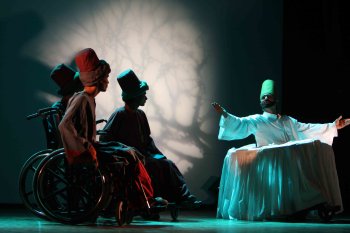
|  |

|  |
Rumi on Wheels - Shanta Serbjeet Singh, New Delhi e-mail: shanta.serbjeetsingh@gmail.com May 1, 2010 No day goes by without someone or the other, from some agency or the other, public or private, friend, acquaintance or then again just someone who has weaseled my contact out of some unsuspecting friend, calls to pick one's brains about random things, from the artists they should choose for a performance, a festival, a special event or sometimes for just phone contacts of others! And of course, this is always gratis! Of course! But one recent recommendation I made, at the request of a team preparing a special film on Delhi for the Commonwealth Games was of 'Rumi on Wheels' directed and choreographed by Syed Sallauddin Pasha. Pasha is the man who has coined the phrase "ability unlimited" for his amazing troupe of persons with disability. The foreign team got back to me with a special note of gratitude for putting them on to Pasha's work. They said they had never been so inspired by a dance work. A little introduction to Pasha's work. They are many, from his major productions like 'Ramayana' and 'Bharatanatyam on Wheels' to the one on Sufi Dance and the life story of Rumi and Shamsuddin Tabrizi, all on wheel chairs and crutches. Rumi said: Duyi az khud badar kardam, yaki deedam do alam ra, yaki joyam, yaki danam, yaki beenam, yaki khanam. That means: I have banished duality from my mind. I see the world as One. I know One, I desire One. I seek One. When Rumi asks Shams, his disciple: And where is the ladder on which I may climb to heaven? Shams replies: It's love. Learn to love. Earthly loves are a mere shadow of Divine Love. Seek the love that cannot be caged by word, he sets the stage for giving the world the deep meaning of Sufi philosophy.  Shams taught Rumi absolute love for the Divine. God is the beloved, the devotee the lover. It is Gohar Khatun, Rumi's wife who, as an ordinary housewife, lays no claim to scholarship or mysticism, who gives us an abject lesson in the unconditional, self - sacrificing love that Shams taught Rumi. Finally, all that matters is love.  The play written by Urdu, Persian and Punjabi writer Amrit Kent, is about the astonishing story of the encounter between Mevlana Rumi and the wandering mystic Shamsuddin Tabrizi that occurred in 13th century at Turkey, in Konya. Jalaluddin Rumi was a respected religious scholar and family man who had inherited his father Bahaldin's madrassa. Despite being a confidante of the ruler and beloved of the people, he was not at peace. Nagged by a feeling of dissatisfaction, he had an intuition that there was more to religious life than his intellectual knowledge of the spiritual path. Shams came to Konya in search of Rumi. His quest was for a man who was worthy to receive the esoteric inner knowledge that he, Shams, was bound to pass on before he died. All mystical paths require a pir or teacher to guide the adept on the right path. 'Rumi on Wheels' points out that yearning can be buried in a person who may not be entirely aware of it and awaits the touch of a barakah or Divine Grace in the form of a guru. Rumi's encounter with Shams was like a bolt of lightening. The Mevlana neglected his family, his madrassa and students and was intoxicated by the sudden discovery of his true purpose in life. Shams broke the mould of respectability that bound Rumi and freed him. Naturally there were repercussions: the people who had revered Rumi now derided him and turned hostile to Shams. Shams disappeared, presumably murdered. Rumi was mad with grief. The key message is that the journey is perilous and demands total commitment. Then slowly Rumi steadied himself and out of him poured his astonishing poetry which was written down by his disciple Chalpi. Rumi's oceanic, didactic work, the Mathnawi, great sprawling stories that indicate the inner and outer journey of a mystic, are relevant even today because the quest goes on. Dressed in the classical white robes and the tall, black hats of Sufi dervishes, designed by fashion designer Anju Modi, the young dancers were a hit, leaving you in no mood to remember minor things like physical handicaps. The gowns were spread out over the sides of the wheelchairs and the boys moved with such dexterity and passion that both the music - by Latif Bolat from Istanbul, and Jatinder Singh of Delhi, and the choreography by Pasha, came alive in a rare chiaroscuro of sound, light and movement. I had seen this work at least twice earlier and it was good to know that my recommendation found such a strong echo in the hearts of the visiting film team!  Shanta Serbjeet Singh, for twenty-five years, columnist, critic and media analyst for The Hindustan Times, The Economic Times and The Times of India, is the recipient of the Lifetime Achievement Award of the Sangeet Natak Akademi and Delhi Govt.'s Sahitya Kala Parishad for her contribution to the field of culture. She just finished her term as Vice Chairman of the SNA, is the founder-secretary of the World Culture Forum and continues as Chair of the UNESCO created NGO APPAN (The Asia-Pacific Performing Arts Network), a position to which she was appointed in 2001. Singh has authored several well-known publications such as 'Indian Dance: The Ultimate Metaphor' (published by Ravi Kumar (Paris), 'The 50th Milestone: A Feminine Critique' (Sterling Publishers, to mark India's fiftieth anniversary of Independence), 'Nanak, The Guru' (Oxford University Press) and 'America and You' (22 editions). |